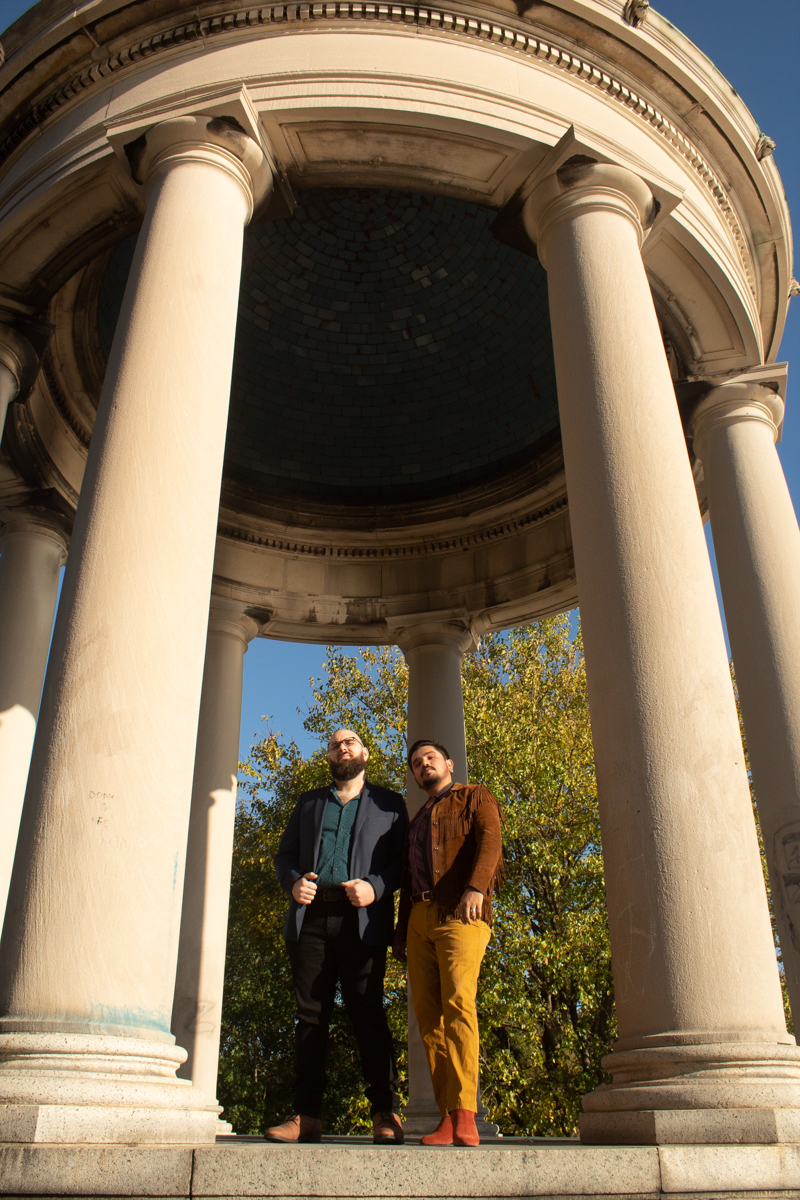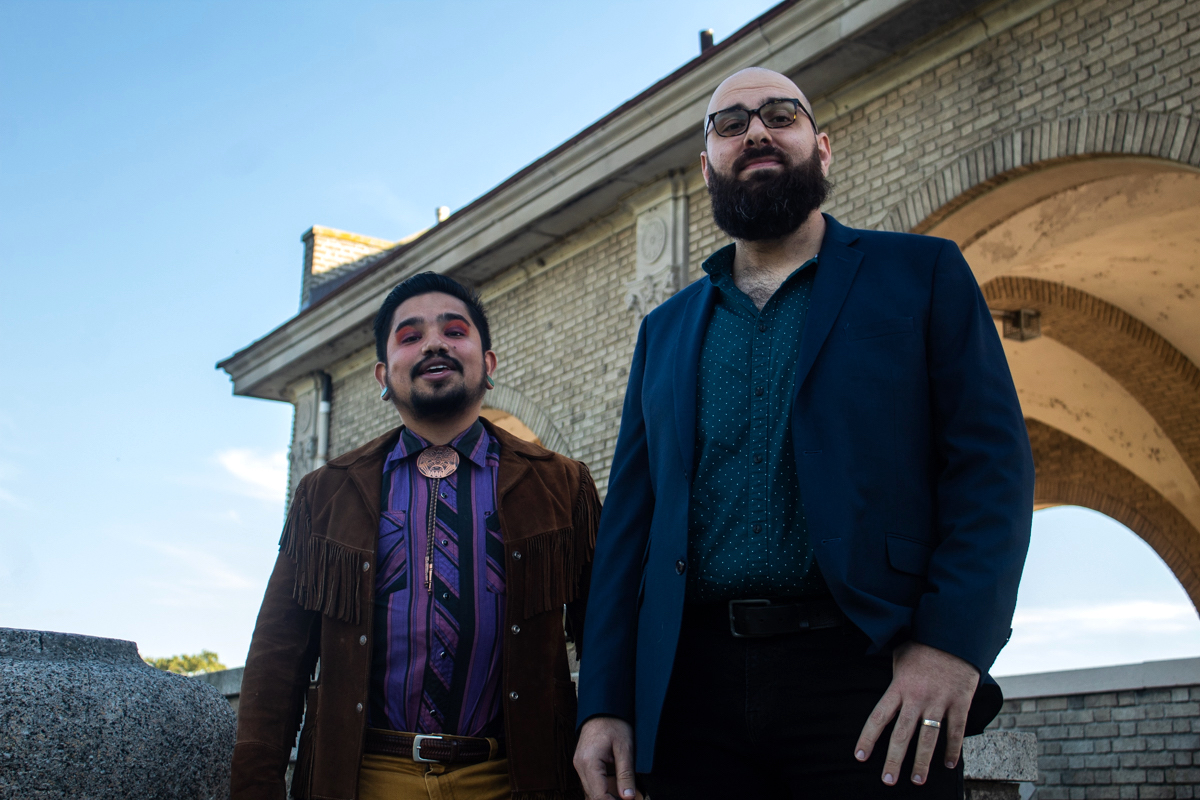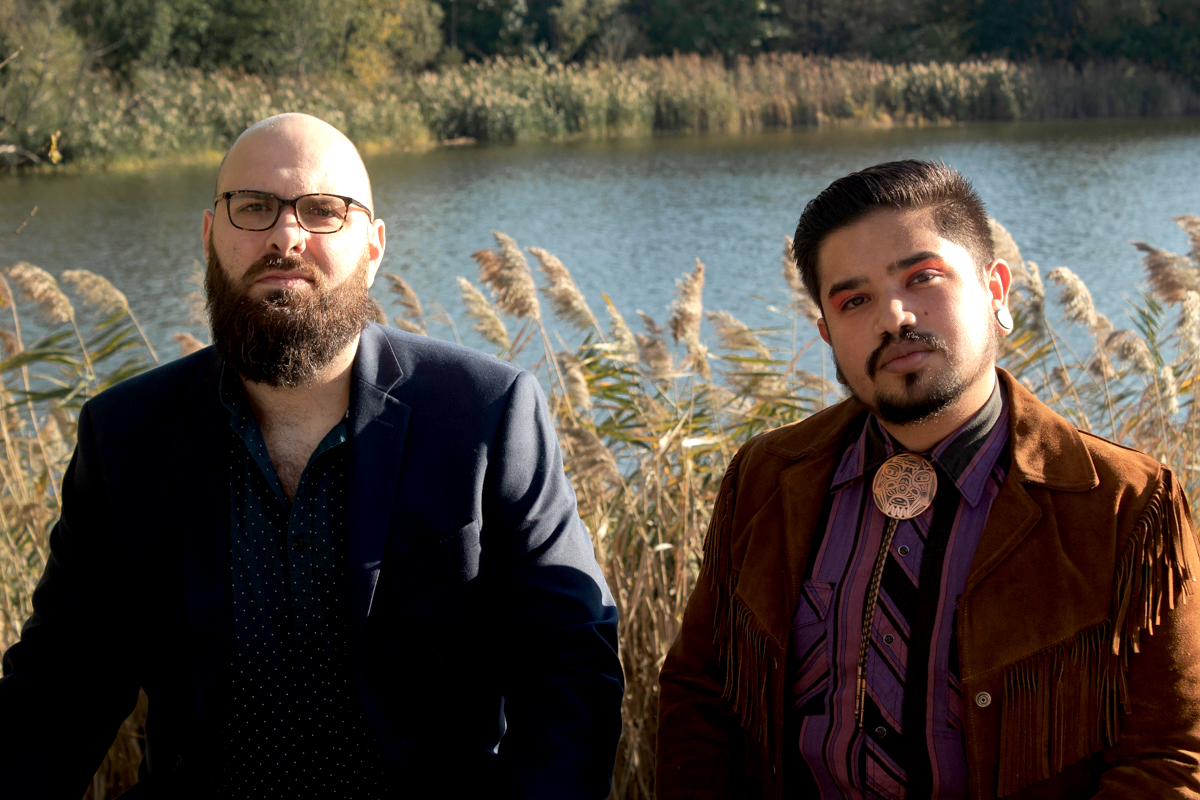
Finding Your Power: ThebandIvory on making space for solace and strength in Anthropocene
When Frankie DeRosa was young, he listened to music to escape into a different world where he found a safety that wasn’t present within his own. This world of his, the one that existed outside the temporary utopic mirage of his headphones, was cluttered with challenges that began at a very young age when he and his mother left Venezuela and their cultural heritage behind to come to America.
He found creative freedom in his adopted family, but it wasn’t until DeRosa arrived at Berklee College of Music, where he met his now-husband and ThebandIvory partner Robbie Simmons, that he was able to become reacquainted with his cultural roots. Things didn’t immediately get easier with DeRosa’s departure from home, though — he faced added challenges around mental health and navigating the consistent political attacks on his identity. But DeRosa was finally able to begin unpacking all of the hardships and traumas in an authentically creative manner.
Anthropocene, the debut album by ThebandIvory, is for others the safe world that DeRosa escaped to when he was young. It is a manifestation of the identity expressions DeRosa had to hide for most of his life, a focus on all of the things, good and bad, that make him whole. Beginning with the first seconds of Anthropocene, ThebandIvory propels listeners into this whimsical world that resembles a dream, but with everything put into it — the stories, messages, outcries, and calls to resistance — it is simultaneously the furthest from being fabricated. It’s the “journey and healing from a lifetime of wounds.” Like a replication of how DeRosa found peace through music as a child, he hopes that his vulnerability and the outpour of himself into this record will allow other queer indigenous Latinx folx to find comfort, community and representation.
Anthropocene departs from genre, finding a culmination of musical influences and adds the tools of DeRosa’s raw and emotive vocals along with his and Robbie’s intuitive production that is driven on their chemistry and willingness to be open. DeRosa and Simmons of ThebandIvory spoke over email about their past, self-reflection and release and the elements that made Anthropocene. This interview has been edited for length and clarity.
The Key:You both seem to be very creatively engaged individuals: your Instagram is full of really beautiful artwork by Frankie for track-by-track previews, handmade bags, handmade candles, and merch designs. What did both of you focus on in your studies at Berklee, and what are your creative backgrounds generally?
Frankie DeRose: Growing up I was lucky to have had grandparents that supported my quirky artistic tendencies. I was always one to draw doodles and construct various things out of whatever I could find. It was just a compulsion to create and alter the world around me. Now as an adult, I tend to do the same but with visual art, sewing and music. My focus at Berklee was unfocused, to say the least. I was searching for my voice in many ways. When you first get into the school, you’re automatically thrown into a jazz ensemble of types, but I was lucky to study ‘ukulele as my principal instrument and doubled on voice / woodwinds so that made my path of learning very open. I was immediately drawn to the Middle Eastern, Indian and Carribean ensembles. I loved the different perspectives and spiritual connection that was celebrated in these ensembles, they opened my eyes to exploring my own ancestral sound colors. Performance was my major but I minored in songwriting. It took me many years to figure out what sonic space my voice feels comfortable in and many more to build my voice up, not only physically but psychologically.
Robbie Simmons: I’ve been playing music since I could walk basically. I started piano at age three, and picked up singing, guitar / bass and percussion along the way. My focus at Berklee was contemporary writing and production, which covers a lot of bases for people like me who like to do a little bit of everything. Of course, the irony of going to a school to pursue creative passions is that once you’re done trying to figure out what teachers want and what gets you the good grades, you have to re-learn how to be honestly creative. That took a little time post-Berklee.
TK:This is a deeply personal record, and it’s described as Frankie’s “journey of healing from a lifetime of wounds.” Just from listening, it is really evident that you poured your heart into the project and the openness is very admirable. Was it difficult to be so vulnerable or did you find more catharsis in doing so?
FD: It was harder than I realized, for sure. It took a lot of self-reflection, bouncing between self-love and self-loathing plus the struggles that millennials face already definitely broke me and forced me to be vulnerable. Seeing POC being killed, locked in cages, and denied participation in the system made me realize just how valuable my voice is. I’m incredibly lucky to have had the cloak of white privilege, being adopted into an Italian family, but it separated me from my mother. Turning 18 and moving to Boston I had to relearn to be myself. I had to find what it was I had to say and refine my ability to do so. I noticed that the artists I was drawn to had shared the darkest parts of themselves, letting the listener in on the secret. I want other queer indigenous Latinx folks to see themselves represented. I hope to be the first of many to own their truth and channel that through what they love most.

TK:Frankie, It seems like you have described a lot of obstacles that have gotten in the way of your music. You mention being stripped of your cultural roots and unable to express that in your music when you were younger. “Wearing Me Down” lyrically speaks to putting forth so much effort into your musical career but continually being met with resistance, and I thought the lyric “I can’t see who I’ve become / where am I supposed to be” really centers on that mixed feeling of hopelessness and losing touch with yourself when you are pursuing something. “Factory Song” also stood out in this regard, speaking to the very frequent occurrence of people working hard yet winding up in a place that wasn’t a part of the plan. Even on their own, these are all really significant challenges, but together, and now combined with the pandemic, something you can both speak to, what has kept you motivated to keep going with making music?
FD: Trust me, I think everyone has wanted to throw their hands up after a lot of resistance but there’s something in my core being that won’t stop me from giving in. I’ve looked off that cliff’s edge (proverbially speaking) but I know I’d never jump. Seeing my peers fight for their dreams fuels that too. I love seeing folks from school or my past become successful. Not to say there isn’t a sprinkle of envy, but I get hopeful that if it’s possible for others it’s possible for me. What really fuels my desire to chase this dream is the sacrifices my mother made for me to be on this planet. She had me at age 15 when her family turned against her. I feel lucky to be alive and I don’t want to waste a moment on this earth, and it may over-romanticize but I like to think I was put on this earth for a reason and it’s my responsibility to find and chase my destiny.
RS: From the aspect of the pandemic, I think just not wanting to let myself be consumed with anxiety and letting that lead into a big pit of depression has been very motivating. As far as making the record itself goes, once we got past the panic part of the world hitting the emergency brake, when we got started and were finishing the songs it just became fun and exciting and everything I love about making records.
TK:The album title Anthropocene feels incredibly fitting for this record. There is a sort of dichotomy where sonically the record honors and is in tune with nature, but lyrics convey the harm humans have caused. Why did you choose sonically to depict a lot of tracks in a really dreamy / beautiful way when really dark topics are discussed?
FD: I think disarming the listener allows them to be wrapped in your sonic world rather than just observing your world. Being vulnerable allows that message to sink into the deepest part of them, where they draw on their own experiences and really empathize. As a kid, I liked living in my room and escaping with music. I’d throw on some Peter Gabriel or Sade and I closed my eyes pretending I was there, being taken away for a moment to a different world where I felt safe. It’s only fitting I get to do the same for my listeners.
TK:On all the tracks, the lyrics are by Frankie, but you both produced the whole record together. Although there are a lot of topics that many people can lean into, it seems like a lot are very specific to Frankie’s particular experience. I am curious how it is working together on such vulnerable pieces of music?
FD: I’m incredibly lucky to be married to my producer, so that vulnerability is baked right in. It’s been years of working on both our personal and professional relationships to find that balance and I think our journey has just begun. When writing this album, the message wasn’t as clear when we’re so hyper-focused on all the elements, but when we took a step back it was. We both wear our hearts on our sleeves and Robbie’s vulnerability has always made it easier for me to follow suit, plus when you live together, that helps that equation.
RS: Part of what got us to the point of being able to finish the record was really finding what our strengths and roles are within the band. Because while a personal relationship is 50/50, the creative process is different. Once Frankie really took hold of the creative process of the writing and we made a conscious decision to make the band a platform for his story and voice, things took shape in a much clearer way. But, as a producer (and I work with other artists in this capacity as well), we’re often working with people’s most vulnerable parts and it’s always a very personal process. If you really listen to a song and you get to know the artist, the song will tell you what it should sound like.

TK:In terms of your process, is collaborating consistent throughout or are there are specific components that you work individually on?
RS: It’s very song-to-song. Every song on the album had a different process. Generally speaking, I shape the rhythm section (drums, bass, guitars, keyboards) but we have amazing musicians who add their own personality to some of those parts as well. Frankie has amazing ideas for orchestrations and occasionally I’ll help refine them. But we both have our hands in a little bit of everything, and we both have to be 100% happy before it’s done.
TK:The production on the record is really, really dynamic, and seems very purposeful, and the exploration of Indian, Middle Eastern and Caribbean music ensembles and other genre influences are explored throughout. Can you tell us what it was like for each of you to dive into a wide variety of these different musical elements?
FD: It’s a lot of fun to explore these different style elements. I was first exposed to mixing cultural instruments into a modern context by Avatar The Last Airbender and The Legend of Korra. As a Venezuelan indigenous person who has Indian and Caribbean lineage, I felt that adding this came naturally. We have Indian flutes mixed with charango (a South American ‘ukulele-style instrument) and strings with electronics. I always felt these instruments invoked a naturally organic soundscape and it all started when I picked up a ‘ukulele. It just reminds me of when I was happiest by the ocean, and the songs all start there.
RS: I have to say that most of my knowledge of Indian and Middle Eastern music comes from what I’ve learned from playing and living with Frankie. But, I’ve always been interested in removing the idea of a specific genre from music and following the path of the song, so even though I’m not necessarily familiar with all the techniques and traditions of these kinds of music, I do understand the sounds of the instruments and how they fit in context with our music.

TK:Tracks like “Closing In” encapsulate this sort of hopelessness when the state of our political climate is plagued with injustices, and the rights of marginalized groups are up for debate every day by those who are not impacted by their own decisions. A mix of external factors, both personal and existential, hindered your expression of identity in numerous ways, and the reclamation of your identity and discussing your tribulations on this record is really powerful. Have the current politics in our country informed your identity expression in your music?
FD: Absolutely. It lit a fire under my ass to own and live my truth daily. Even just trying to navigate the BLM movement made me have to understand where I sit in this whole discussion. It made me ask myself how I could use my voice to help others be seen and heard. It may seem simple but my perspective as a genderfluid ethnic artist being recorded, packaged and hopefully celebrated is exactly the world I want to live in. I didn’t see myself represented in the music industry and I’m here to change that for other artists to step into themselves.
I want to see a society that values queer BIPOC art and doesn’t just amplify the voices of cookie-cutter pop artists. Marsha P. Johnson once said, “History isn’t something you look back at and say it was inevitable, it happens because people make decisions that are sometimes very impulsive and of the moment, but those moments are cumulative realities.” I like to think I’m one cog, one factor that could help move this country in the right direction. My reality can help validate the cumulative realities of history and shape it for the better. I shouldn’t feel unsafe wearing my heels or my hoop skirt out in the world, so I’m going to do it anyway for myself and for the children.
TK:What have been the most important takeaways from this whole process so far?
FD: My biggest take away was finding my power. We didn’t need a giant label to make this all happen. We scraped and spent money where we had to. My mind is blown when I remind myself that this album was 90% recorded in our apartment. I get to make music with my partner-in-crime and have total autonomy over the project. No one to answer to, just our own creativity leading the way and I wouldn’t have it any other way.
RS: Probably to trust ourselves through the process. We tried a lot of things, tried working with different musicians and engineers and ultimately when we grabbed the process by the balls and ran the whole show ourselves, we finally got what we wanted and made the most honest record we could. We usually know at the beginning when something isn’t going to work and we need to trust that instinct.
ThebandIvory’s Anthropocine is out today, and can be purchased in digital or limited-edition cassette formats at their Bandcamp page; they’ll play an album release livestream tonight at 7:30 p.m. with Laura Lizcano, who also released a record today.
